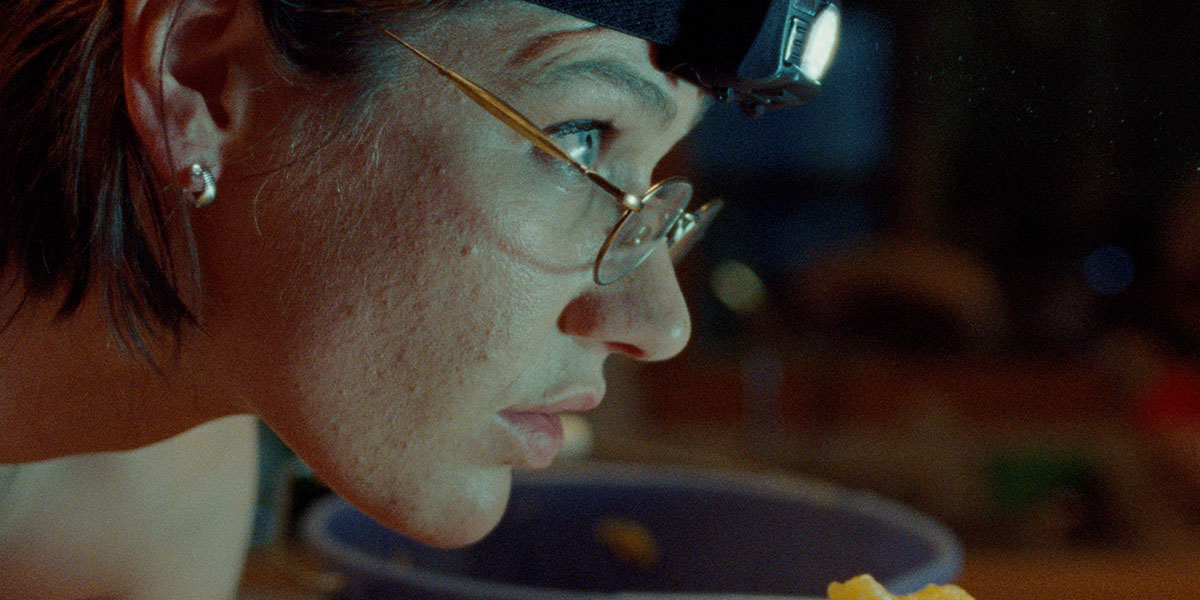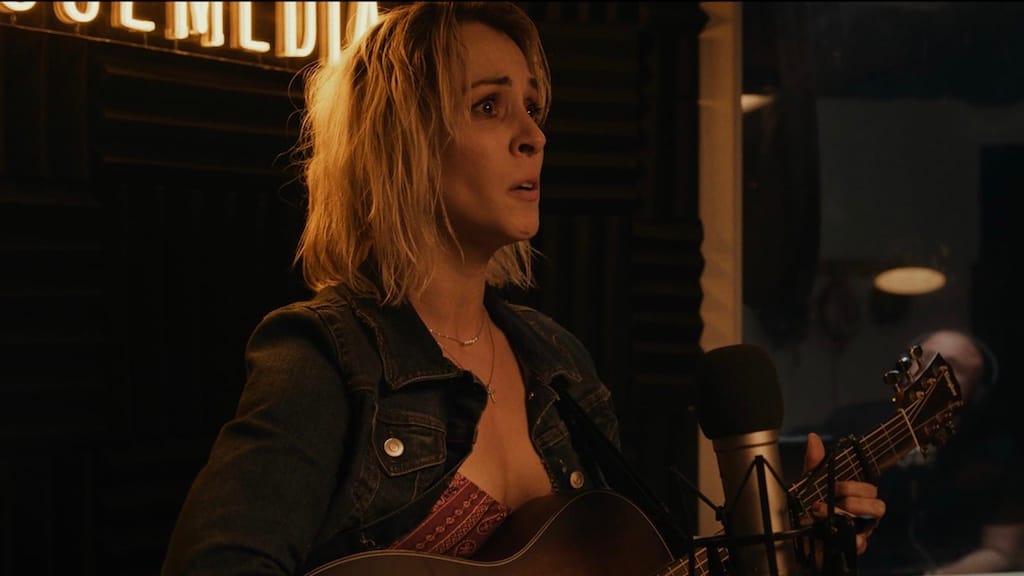
A Promising, But Ultimately Messy Paean To Sisterhood & Sustainable Living [TIFF]
Dec 17, 2022
“Until Branches Bend,” which plays in this year’s TIFF Spotlight section, is a promising but poorly executed debut from Canadian filmmaker Sophie Jarvis. While it tries to be a paean to peaches and sisterhood and sustainable living, and at times a cri de coeur against corporate greed, it is none of these things. Because it’s all of them messily at once, resulting in some passingly feel-good, though mostly half-baked, festival fare.
The quirky hero-naïf of the film is Robin, a thirtysomething grader at the local peach-packing house. Straight away, her kind-heartedness and natural benignancy recall Laura Dern’s Ruth Stoops (that both women deal with an unexpected pregnancy is purely coincidental), but she could just as easily pass for the ditzier, Canadian cousin of Greta Gerwig’s Frances Halladay. She’s well-liked in her small community of Montague—located somewhere in the Okanagan Valley, British Columbia—and by her younger, free-spirited sister Laney, with whom she lives a quiet life. To neighbors, friends, and co-workers, she’s endlessly sympathetic and amiable, and unwittingly complaisant, always wearing a curious but thoroughly confused look on her face.
READ MORE: TIFF 2022: 16 Must-See Films To See At The Toronto Film Festival
One day, while her colleagues are out on a smoking break, Robin spots a wormhole in one of the peaches and, upon cutting it open, catches a thumbnail-sized beetle scuttling out of the flesh. She takes the specimen to her boss, Dennis (a cartoonish villain, whose rampant ineptitude constantly belies his apparent success), who then calls in bug guy Gary, whose expert entomological opinion is that “It doesn’t look insect-related.” With an eye on their profits, the bigwigs decide not to tell Food Inspection about the intruder, leaving Robin with a choice: forget about the cover-up and get on with her life or pursue the case a little further.
Naturally, Robin can’t resist finding out what sort of bug it is; and so, on her way back from an abortion clinic, she pays a visit to the Agri-Food Research Center, managed by the National Food Inspection Agency (NFIA), to show one of the scientists there a picture of her six-legged friend. (Incidentally, the bug-fetus parallel, and the film’s comment on abortion rights in North America more generally, begins and ends here.) In a matter of days, the packing house is closed down pending an NFIA inspection, and Robin becomes the scapegoat for the residents’ looming joblessness. Meanwhile, Laney gets romantically involved with a sententious college student; and Dennis and Gary relax with their wives at the country club bar.
There are two main problems with the plot of “Until Branches Bend.” Firstly, the role of the NFIA. Given the haste with which they close the packing house, you would expect their subsequent investigation to be both serious and exhaustive; after all, the fate of several million crops, and by extension, the fate of the town, depends on the veracity of their ruling. Surely they’d pore over the packing house’s CCTV footage and logbook entries and Dennis’ bogus internal report, before dissecting the metadata of Robin’s original snap (to prove it’s not doctored, as Dennis claims) and conducting interviews with each eye-witness (Robin, Dennis, and Gary). But the case they build is neither serious nor exhaustive, since, apparently, all it takes to sway the Department to vote to reopen is a meek cabal of lacklusterly chanting residents, leaving us to wonder whether the folks over at the NFIA are uniformly incompetent or just simply took the week off.
Secondly, there is the problem of arithmetic. With the entire town on the qui vive for bugs, it defies belief that Robin is the only worker or resident who actually spots one before a climactic plague of near-biblical scale and fury razes the town and its produce. Evidently, Jarvis’s Okanagan is an ecological outlier, strictly harboring either one beetle or a billion and never any number in between. And no explanation is given for this oddity. All we get is a bathetic shot of Robin sauntering into the swarm, arms outstretched, like Christiane’s eclosion in “Eyes Without a Face,” while the beetles ravage the orchards and do their best not to bump into her. But what is this shot supposed to convey? That Robin is some kind of entomancer? That the suspiciously spatially aware beetles were figurative all along? The tangible devastation wreaked by the plague would suggest the answers are No and No. What we’re left with, then, is a comically indulgent, mostly implausible, and needlessly long strut of vindication—which is to say, a husk of failed cine-poetry.
READ MORE: Fall 2022 Preview: 60+ Must-See Films To Watch
Grace Glowicki’s central performance is endearingly offbeat though markedly one-note—with that note being a continued timidity and optimism in the face of a crumbling quixotic worldview. Likewise, Lochlyn Munro’s intransigent Dennis is hopelessly bland and inauthentic, present only as a kind of moral piñata whom we can all clout and feel good for clouting. But it’s not all bad. Alexandra Roberts shines as Laney, perfectly capturing the sad and dreamy restlessness of fleeting youth in an antique town. All the quips and remonstrations are as playful as they are timorous, and they’re delivered by Roberts with an ease and subtlety that discloses—just enough—the fantasy life, far away from Montague, whose image Laney carries in her heart. There’s a neat coming-of-age story buried somewhere in this film; Jarvis just needs to exterminate the bugs and find it.
Competent, too, is the cinematography by Jeremy Cox. He subtly adds to the desert ennui by evacuating just about every drop of rain and breath of wind from the landscape. (After half an hour of xeric plains and dust-swept streets, you start longing for a glass of water.) Much less considered is Kieran Jarvis’s tripartite score, which irritates from beginning to end with its discordant bustle of leitmotifs. Granted, the warbling choir voices snapped by caesurae are suitably disquieting and oppressive, especially in Robin’s more delirious scenes, but the wailing flutes and gruff bass drones, which live and die by two refrains, announce when the game’s afoot with enough conspicuity to cause even row Z-ers to roll their eyes (if they haven’t already been deafened by the squalls of Act I, that is).
In the end, however, the success or failure of the film hinges on Robin’s narrative arc—or, more accurately, her lack of one. Sure, at the film’s close, she looks out over the dead land as though she’s learned something about the world and its injustices, perhaps even about the occasional benefits of cynicism in relation to politics. But, if so, how? Based on what she does (or, rather, doesn’t do), it’s hard to see how she’s any less naive or impressionable or invertebrate than she was at the beginning. Our sympathies for her dewy-eyed misadventures are never challenged or emboldened—or, better yet, displaced altogether—by a more mature and worthy admiration for any outspokenness or whistleblowing or new-found mettle. Nature simply takes care of things; Robin hardly has to be there. What Jarvis has given her is a milquetoast protagonism, the kind that only feigns resolve, overcoming, ecological concern, and sisterly love, in order to prettify its one genuine device: the simple and sustained request for our pity. But pity alone can only take a film so far; because, in spite of how gratifying it may be at first, you soon grow tired of patting yourself on the back. [C-]
Follow along with all our coverage of the 2022 Toronto International Film Festival.
Publisher: Source link
TV Shows That Got Canceled In 2024
TV Shows That Got Canceled In 2024 Which 2024 canceled TV show will you miss the most? Share your pick in the comments! Disclaimer: This story is auto-aggregated by a computer program and has not been created or edited by…
Dec 22, 2024
How The Talk Emotionally Ended After 15 Years
The Talk has officially said "Goodbye." After 15 seasons and 2,993 episodes, the CBS daytime show came to an end on Dec. 20 with a heartfelt farewell from hosts Akbar Gbajabiamila, Amanda Kloots, Natalie Morales, Jerry O'Connell and Sheryl Underwood. The episode began with a standing ovation for the…
Dec 22, 2024
Jennifer Lopez Asked About Turning 60, Age
Jennifer Lopez Asked About Turning 60, Age Never ask a woman her age, a man his salary, or Jennifer Lopez how she feels about turning 60. On Sunday, the actor was interviewed by Variety amid the release of her new…
Dec 21, 2024
Lala Kent Shares Text With Ally Lewber After James Kennedy’s Arrest
The BCU (Bravo Cinematic Universe) was shaken on March 3, 2023, when it was confirmed that Tom and Ariana had ended their nine-year relationship amid the revelation that he'd had a seven-month affair with Raquel. "I made mistakes, I was…
Dec 21, 2024











